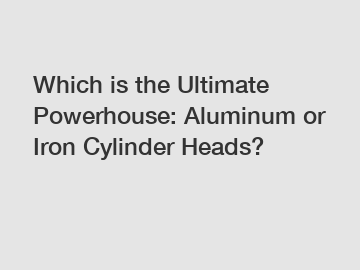Which is the Ultimate Powerhouse: Aluminum or Iron Cylinder Heads?
Which is the Ultimate Powerhouse: Aluminum or Iron Cylinder Heads?
The debate between aluminum and iron cylinder heads has been ongoing in the automotive industry for decades. Both materials have their own set of advantages and disadvantages, making it difficult to determine which one is the ultimate powerhouse. In this article, we will dive into the features and performance characteristics of each material to help shed light on this heated discussion.
Strength and Durability: The Battle Begins.

When it comes to strength and durability, iron cylinder heads have long been considered the champions. Iron is a tough and sturdy material that can withstand higher levels of heat and pressure compared to aluminum. It has excellent resistance to deformation, making it an ideal choice for high-performance engines that demand immense power. Iron cylinder heads are less prone to warping and cracking, ensuring longevity and reliability. This makes them popular in heavy-duty applications such as towing and racing.
Weight: The Featherweight Contender.
On the other hand, aluminum cylinder heads are significantly lighter than their iron counterparts. The weight reduction achieved with aluminum heads can enhance a vehicle's overall performance. Lighter engine components allow for better weight distribution, resulting in improved handling and maneuverability. Additionally, aluminum dissipates heat faster than iron due to its higher thermal conductivity. This property aids in cooling the engine, which is crucial for preventing overheating. The reduced weight and superior thermal conductivity of aluminum cylinder heads contribute to increased fuel efficiency and better overall performance.
Heat Dissipation: The Cooling Effect.
Aluminum cylinder heads are proficient in dissipating heat due to their superior conductivity. This means that they are better equipped at transferring heat away from the combustion chamber and into the cooling system. Improved heat dissipation helps prevent hot spots in the engine, reducing the risk of detonation and engine failure. Iron, while not as efficient in heat transfer as aluminum, exhibits greater heat retention capabilities. This characteristic can be advantageous in colder climates or during extreme driving conditions where maintaining optimal engine temperature is critical.
Cost and Availability: Making the Right Choice.
When it comes to cost, iron cylinder heads are generally more affordable compared to aluminum. Iron is a common and readily available material, making it a budget-friendly option for engine builders and enthusiasts. On the other hand, aluminum cylinder heads can be more expensive due to the cost of the material itself and the additional machining required. However, advancements in manufacturing processes have resulted in a wider range of affordable aluminum cylinder head options in recent years.
Choosing the Right Powerhouse.
Ultimately, the choice between aluminum and iron cylinder heads depends on the specific requirements and preferences of the vehicle owner. Iron heads excel in heavy-duty applications that demand strength and durability, while aluminum heads offer weight reduction, better heat dissipation, and improved fuel efficiency. It is crucial to assess factors such as performance goals, budget, and intended use before making a decision.
In conclusion, the debate between aluminum and iron cylinder heads is not easily settled. Each material possesses unique characteristics that cater to different automotive needs. Whether you prioritize strength and durability or opt for weight reduction and improved heat dissipation, the choice lies in determining which factors are most important to you and your vehicle.
For further information or assistance in selecting the right cylinder heads for your engine, please do not hesitate to contact us. Our team of experts is here to help you make an informed decision tailored to your specific requirements.
Are you interested in learning more about car engine valve price, Cost of Car Engine Valves, Engine Valves 12575354? Contact us today to secure an expert consultation!

Comments